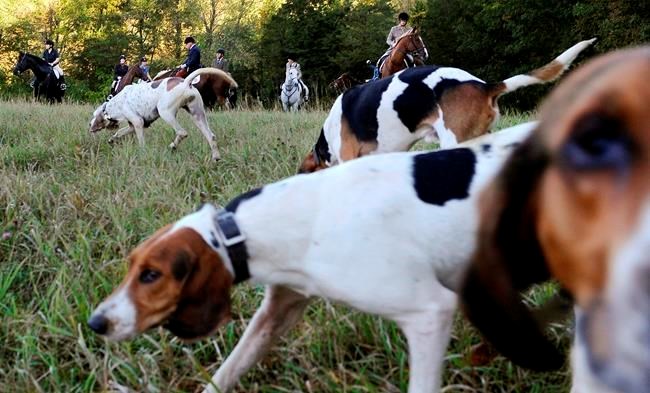TORONTO — Two animal rights organizations have requested a review of a new Ontario law that expands a licensing regime that allows dogs to track down captive coyotes, foxes and rabbits in massive fenced-in pens.
Last year, the province passed legislation that would allow the expansion of licences for so-called "train and trial" areas where hunters can bring their dogs to search for, and chase down, wild animals. The dog sport has seen its numbers dwindle since past Progressive Conservative premier Mike Harris's government made new licences illegal and allowed others to phase out.
Animal Justice and Coyote Watch Canada filed the review request last week under the province's Environmental Bill of Rights, asking Natural Resources and Forestry Minister Graydon Smith to both stop the train and trial area expansion plans as well as phase out existing ones.
"The more that we learn about these penned dog-hunt areas, the more we're concerned about the risks to wildlife and the risks to public health as well," Camille Labchuk, executive director of Animal Justice, said in an interview.
The training component sees hunting dogs let loose in these areas, which are often hundreds of hectares in size, but fenced in around the perimeter. The dogs learn to hunt animals such as coyotes, which are caught in the wild and re-homed to these areas.
The trialing portion involves competitions with judges who score the dogs on their hunting skills. Points are awarded and champions crowned.
The law says wildlife is not to be hurt during these practice hunts, but the reality is different, two former conservation officers told The Canadian Press last year.
The former officers, Rick Maw and Wayne Lintack, spoke out about the province's plan to expand the dog sport, saying it was cruel towards wildlife, particularly coyotes.
They said coyotes had been hurt and killed by dogs in the past. The pair also spoke about uncovering a coyote trade ring where the animals were caught illegally, stuffed into a small room in a barn and sold off to other hunters to be used in other train and trial areas.
Last year, after lobbying from hunters, Doug Ford’s government decided to expand the sport. The Ontario Sporting Dog Association said no animal is hurt in the sport. The expansion also has the support of the Ontario Federation of Anglers and Hunters.
The province has proposed to grant new licences through a one-time 90-day application period, which is expected to open soon, and allow licences to be transferred to new owners.
The sport is "cruel and inhumane," the animal rights organizations say in their review application.
"These operations subject captive animals to horrific physical and psychological distress, and also create an unsafe environment for the dogs who are trained to chase these animals being used as live bait," Animal Justice and Coyote Watch Canada said in their application.
Animals to be used as bait in the sport are to be trapped humanely, the law states.
The minister declined to comment, saying he has not yet had time to review the application.
The ministry said it is also reviewing the application.
"Currently, all train and trial facilities are operated responsibly and meet strict regulatory requirements, including meeting care standards for wildlife," said Marcela Mayo, a spokesperson with the ministry.
"We are committed to ensuring this continues."
Conservation officers inspect the facilities and "will take necessary enforcement action, as they have in the past, and as they will continue to do in the future," Mayo said.
There were more than 60 such train and trial areas in 1997, but that number has fallen to 24 provincewide. The law made it illegal to sell or transfer those licences.
No other province allows such train and trial areas using live animals as bait, except for Manitoba, which allows the use of live game birds but no other animals, the review application states.
Fox and coyote penning is banned in most U.S. states, the application notes.
Ontario's Green party said it stands with Animal Justice and Coyote Watch Canada.
"There’s a reason that penned dog hunting is banned in almost every other Canadian province," said Green Party of Ontario Leader Mike Schreiner.
"It’s incredibly cruel to the wild animals that are used as live bait, and creates a dangerous environment for the dogs being trained to hunt and kill. These so-called trial and train facilities have no place in Ontario."
This report by The Canadian Press was first published March 27, 2024.
Liam Casey, The Canadian Press



